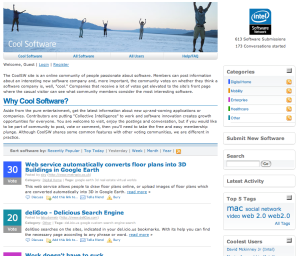
Looking in the mirror at just what objects did appear closer as the year comes to a close, I suspect a key question on your mind is: What is Mac’s prognostication of digital home and general usage trends next year…?
1. Music is THE Application for Mobile Phones
CD-quality music is going to be on more than half the entry-level cell phones used around the world by year-end. Music will be THE application on cell phones measured by consumer use and revenue-generated by handset makers and wireless service providers. Apple proved people will pay for good-sounding music, including hundreds of their favorite songs, easily accessed by simply pressing a button. And these music cell phones will store hundreds and late in the year thousands of songs, which is plenty for the average music fan.
But what about video or Mobile TV adoption? Mobile TV will continue to develop, but will be challenged to win market acceptance because of the small size of cell phone screens. Battery limitations and the small screens make long-term, non-stop viewing unappealing, not a good user experience. The most likely mobile TV applications will be people checking sports scores and updates; cartoons, videos, standup comedy etc., and/or general news. All these will need to fit in about a 3-to-15 minute time frame, according to most industry experts. Many people won’t watch TV on a cell phone for much longer than that, except for some special, out-of-the-mainstream reasons. Mobile TV’s early adopters are expected to be mass transit commuters, primarily Asian and European adults. Look for those countries to be early adopters.
2. Apple iTunes Remains Dominate
Apple will see their iPod market share erode in ’07 from increased competition thanks to Microsoft (Zune), the increased availability of independent video subscriptions (studio’s, broadcasters, news organizations etc.,), and the MTV URGE marketing juggernaut of VH1, MTV and CMT.
The “Leopard” version of the OS will extend Apple MSS to 8% and the FrontRow: media access embedded in the OS along with iTV is what the digital home needs in an interface device. The OS and device will be hugely successful with Apple retail stores able to promoting a compelling value proposition for consuming video content on your schedule…on any device… any time and keep those “buying eye-balls” on iTunes.
The increase in content sources and video quality of the iPod will drive demand for portable video players and subsequently on demand video content. The standard drive size for an iPod will be 100GB by year end. Flash models will ship with 8GB standard and upper end units with 15GB.
The Apple iPhone (Cell phone) will have few new features, but will become big sellers. It won’t be introduced at MacWorld rather it will be mid-year.
3. IPTV Over-Hyped and HDTV Prices Drop as Demand Increases.
The first sub-$500 27-inch LCD HDTV will hit the market. The dramatic price drops are causing consumers to not only upgrade living room sets, but buy additional units for different rooms in the house.
IPTV adoption and speculation will continue to be rampant and over-hyped. Industry pundits will continue to state that it’s right around the corner and that the deals are ramping the industry. New mega-revenue streams don’t exist. There are opportunities for the industry, including programming for non-traditional platforms, but 2007 will not be the year for broad adoption.
4. Blu-Ray and HD-DVD Sales Stall
With no HD-DVD standard concluded, format wars will continue to confuse the consumer and retail is unable to position the differences. Touted as the second coming of the DVD, it’s starting to look a lot like the second coming of the Laserdisc. The inclusion of 1080p support in Playstation 3 (PS3) won’t matter to consumers because there is very little content available and it’s at a premium price.
Speaking of Sony — they will stumble over backwards compatibility with PS2 games and lack of an interactive strategy. Gamers will become further addicted to Xbox 360 combined with Xbox Live, where points and ratings offer a direct comparison of skills against other Xbox Live members, which leaves PlayStation 3 out in the cold. For the console market, 2006 will be game over at Sony.
5. Generation C (Content) Mind Share
In three years, people born between 1980 and 2000, will outnumber Baby Boomers and Gen-Xers. They will be a consumer sector of tremendous importance to the media & entertainment industry. Not only are they big, but they will be fragmented and difficult to reach. The increasing number of media channels – instant messaging, email, social networks, iPods, mobile phones, Tivo, P2P networks, handhelds, video games, etc., – through which this group communicates and consumes media & entertainment, makes them a very elusive target for us to market to them. The characteristics of this generation – one embracing a pervasively digital world – and the implications for media, entertainment, and advertising is going to drive everyone nutty.
Social networking services will morph into something even less useful, like social shopper with coupons and we’ll see sites provide buying recommendations triggered by your profile data.
6. Microsoft Success
Late-February they issue a Press Release proclaiming that “Windows Vista is the best selling operating system ever.” Consumers will love the Vista Media Center Edition with Xbox 360 connectivity in large scale. Adoption rates of Vista with XP customers will be very slow due to computational and memory requirements.
Frustrated with Apple’s market power, the music industry will move aggressively closer to Microsoft. It won’t matter, as the Zune will be deemed the most underwhelming product Microsoft has ever made. And afraid of Microsoft’s market power, the movie industry will try to cozy up to Washington.
Groove collaboration software will ship in the Office suite for the first time. It won’t matter as more significant desktop apps will move to an Ajax/server-based design like Zoho.
7. MPAA Supports Consumer Content Value Chain (When Pigs Fly!)
We buy a title, not a particular file for a title (so, we buy video once, for all devices)
“Stop, pause, resume, buy, rent, etc.” all work across platforms, devices, and service providers/retailers
Content transcoding is a job for the professionals and the serious hobbyists and the MPEG, H.264, video compression codec’s…whatever, is banned from everyday consumer vernacular
We need to know as much about DRM as we need to know about locks in our bank safety deposit vault
Content (purchased and our own creations) are as safe as credit cards (Meaning we should be angry when someone rips the content that we had to pay for)
I left off the ever important legal prediction…there will be a felony conviction in the U.S. for a crime committed entirely in a virtual world and for the Wiki people, the word “mashup” will be the most overused word in 2007!
Read Full Post »
 By now you’ve read about Warner Bros. Entertainment announcement to drop HD DVD and focus on Blu-ray, a Sony Corp. backed technology vs. rival Toshiba. Warner was the last major studio to put out movies in both formats and after May they will exclusively release on Blu-ray.
By now you’ve read about Warner Bros. Entertainment announcement to drop HD DVD and focus on Blu-ray, a Sony Corp. backed technology vs. rival Toshiba. Warner was the last major studio to put out movies in both formats and after May they will exclusively release on Blu-ray.  Like the famous
Like the famous 




